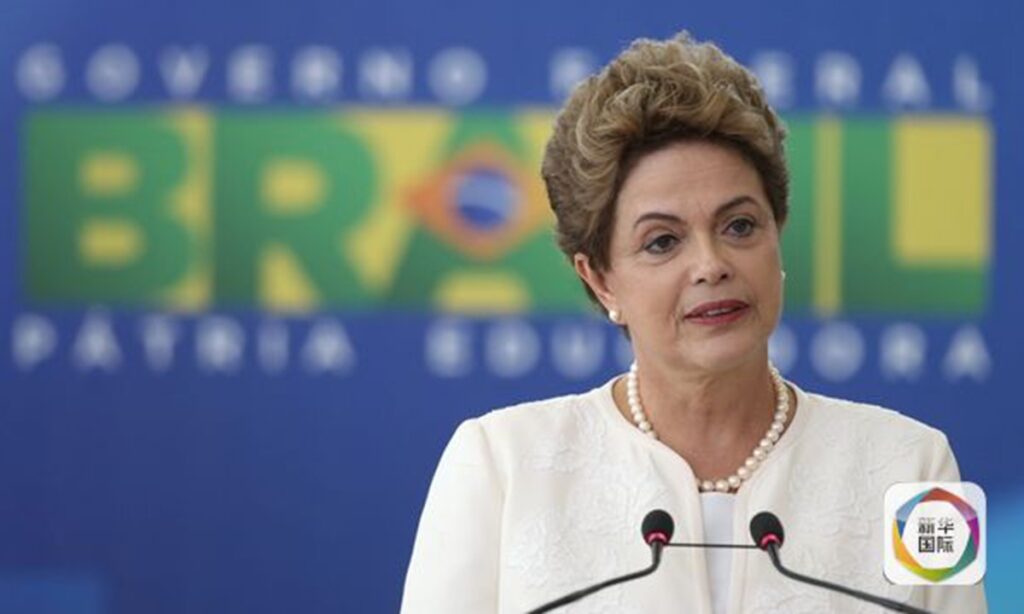Bilateral exchange marked by booming regional relationship between China and the Latin America.
China and Brazil have built a close relationship in the past five decades that is “complementary and integrated” in multiple economic fronts, Dilma Rousseff, the chair of the New Development Bank and former president of Brazil, told the Global Times in an exclusive interview.
She noted that the political and economic exchange between the two countries is also marked by booming relationship between China and the Latin America.
“China and Brazil understand each other in a multi-polar world. We have a lot of common understandings, for example in ensuring a development that is sustainable and protects the climate, and a development that is people-centered and against inequalities. The most important thing right now is that we [both as developing countries], can contribute to global governance and create conditions for building a community with share future,” Rousseff said.
The remarks were made during Brazilian Vice President Geraldo Alckmin’s ongoing official visit to China from Tuesday to Saturday. This year marks the 50th anniversary of the establishment of diplomatic relations between China and Brazil, and the two sides agreed to hold the meeting of the China-Brazil High-level Coordination and Cooperation Committee to discuss further expanding bilateral cooperation, according to China’s Foreign Ministry.
“China and Brazil are comprehensive strategic partners. Relations between the two countries have registered continued and steady growth in recent years, with frequent high-level visits, fruitful cooperation in various areas, and close coordination on international and regional affairs, setting a fine example of major developing countries working together in solidarity for common development,” China’s Foreign Ministry spokesperson Mao Ning said at a regular press briefing last week.
According to Rousseff, there’s also a regional cooperation “mark” that is shaping the development of bilateral relations between China and Brazil.
The year of 2024 is the 10th anniversary of the establishment of the China-Community of Latin American and Caribbean States (CELAC) Forum, a milestone mechanism that facilitates China-Latin American relations into a new era, featuring equality, mutual benefit, innovation, openness and tangible benefits for the people.
Rousseff noted that China and Brazil have made great common investments in area of subjects including satellites and energy fields, and China has invested a lot in the exploration of crude oil and natural gas in Brazil.
“Back to the year of 2004, there were two important things: the first is Brazil recognized China as an economic market after China’s admission to the WTO in 2001. The second is that a Chinese company won a contract to construct a 1,000-kilometer-long gas pipeline that linked Brazil’s southeast with northeast regions,” Rousseff said.
For the Brazilian economy, the contribution of China is very important, Rousseff stressed, exemplified by China’s huge imports of Brazilian protein products such as beef, chicken and pork, as well as Chinese investment in such sectors as new energy, pharmaceuticals, vaccine production and biotechnology – among others – which facilitates Brazil’s new industrialization push.
China has become Brazil’s largest trading partner for consecutive 15 years, and Brazil is currently China’s ninth-largest trading partner. Last year, bilateral trade between China and Brazil expanded 6.1 percent year-on-year to reach $181.5 billion, customs data showed.
It is expected that Brazil’s exports to China could hit $103.4 billion by 2030, according to a report by the China-Brazil Business Council.
Among the main products Brazil exported to China, soybeans, crude oil, and iron ore are the top three exports, accounting for nearly 80 percent of Brazil’s total exports to China, with beef and pulp exports also maintaining stable expansion in recent years, according to the report. Last year, Brazil’s cotton exports jumped 1,295 percent and 1,288 percent in terms of export value and volume, making it the sixth-largest export product.
It is expected that the two countries will keep on deepening cooperation in agriculture, bio refineries, organic fertilizer production, artificial intelligence and robots, she said, adding that the huge Chinese market is also a drawer for Brazilian companies.
Global Times




